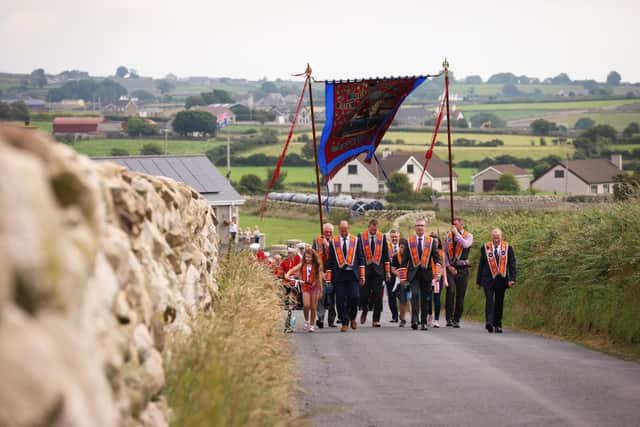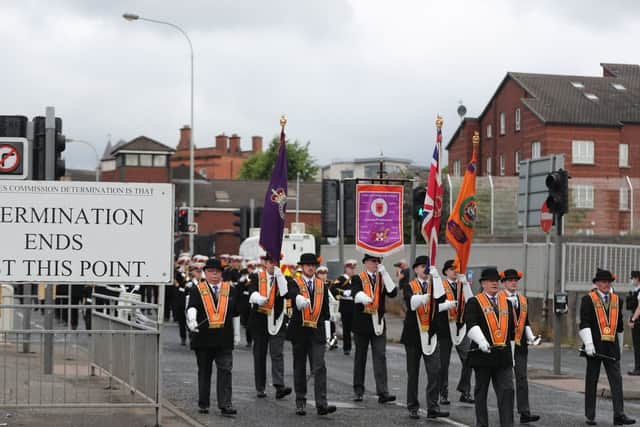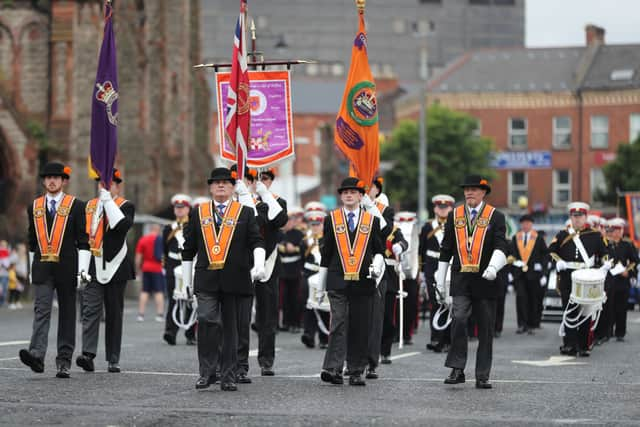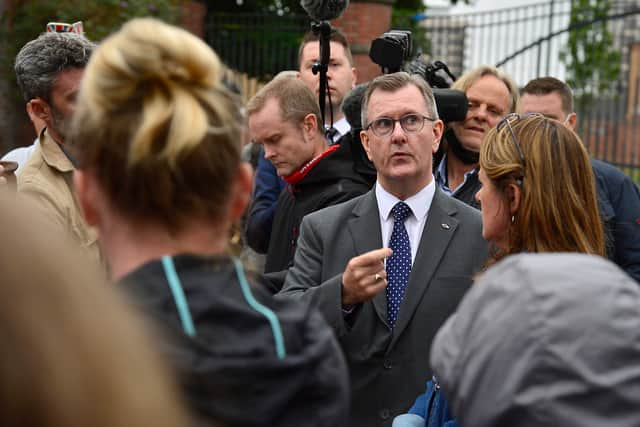TWELFTH 2021 - LIVE UPDATES - Peaceful Twelfth celebrations a huge success as Orange Order pull off remarkable day in midst of Covid-19 pandemic
and live on Freeview channel 276
Scroll down for more on this story.
Thousands take to the streets as Twelfth of July parades pass off peacefully
Key Events
- Thousands take to the streets as Twelfth of July parades pass off peacefully
- First Minister and father enjoy the Twelfth in Bushmills
- Twelfth of July parades take place across Northern Ireland
- Sir. Jeffrey Donaldson condemns burning of Irish tricolours and election posters on loyalist bonfires
Thousands take to the streets as Twelfth of July parades pass off peacefully


Thousands of Orange Order members have taken to the streets across Northern Ireland to mark the main date in the Protestant loyal order parading season - writes Jonathan McCambridge, PA.
This year’s Twelfth of July parades were smaller than usual and locally based due to public health concerns.
Organisers stuck to plans to have parades of no more than 500 people, even though the limit on public gatherings imposed due to Covid-19 has been removed.
The normal 18 main events were replaced by more than 100 local parades in a number of cities, towns and villages.
The Order said organising smaller parades was the best way to ensure the demonstrations went ahead.
As well as the reduced size of the parades, there were fewer spectators lining the roads this year.
The Twelfth parades mark the victory of Protestant King William of Orange over Catholic King James II at the Battle of the Boyne, north of Dublin, in 1690 – a triumph that secured a Protestant line of succession to the British Crown.
DUP leader Sir Jeffrey Donaldson marched with the Ballinran Orange Lodge in Kilkeel, Co Down.
He told the PA news agency: “This is the community in which I grew up, my family still live here and it is great to come back and to meet people that I haven’t met up with in years.
“It is a very much scaled-down parade of what it would normally be but it is good to see some parading resuming on the Twelfth. I think people are just glad to have a day out.”
The vast majority of Twelfth events are peaceful, although in some years there have been flashpoints involving Orange lodges and nationalist residents.
The Parades Commission, which rules on contentious gatherings in Northern Ireland, had imposed conditions on a number of marches.
Up to 2,000 police officers were on duty throughout the day, but no trouble was reported.
There was a significant police presence for parades in Belfast on Monday through the Ardoyne area and past St Patrick’s Catholic Church on Donegall Street.
Assistant Chief Constable Jonathan Roberts said: “I am pleased that today has passed without incident.
“I would like to thank and acknowledge all of the people who helped make this a safe and enjoyable day for many.
“We will be continuing our duties throughout the night to keep our communities safe.”
In Belfast, a number of small parades took place before the bands gathered at Carlisle Circus ahead of the march through the city centre and on to Shaw’s Bridge.
Traditionally, parade participants congregate at fields where they hear speeches and prayers delivered by senior Orangemen before a return march, but that did not happen this year.
The Grand Orange Lodge of Ireland had called on everyone attending a parade to respect Covid-19 guidelines.
Last year’s Twelfth of July parades were cancelled due to the pandemic and restrictions on public gatherings.
The Twelfth parades were preceded by the traditional burning of Eleventh Night bonfires, which this year took place on Friday, Saturday and Sunday nights.
A Northern Ireland Fire and Rescue Service (NIFRS) spokesman said: “Northern Ireland Fire and Rescue Service has dealt with a significant increase in emergency calls and mobilisations to bonfire-related incidents over July 9, 10 and 11.
“The service was exceptionally busy on each of the three nights, with direct intervention required by NIFRS to protect properties from radiated heat, embers, etc from the bonfires.”
A 17-year-old boy is in a critical condition after he suffered burns to his face and body at a bonfire in Silverstream Crescent, north Belfast.
Sir Jeffrey condemned the burning of Irish tricolour flags on some bonfires.
He said: “I take a very clear view that if we want to have people respecting our culture and our traditions then we need to show respect to others. I don’t want to see election posters, flags and effigies burnt on bonfires. I think we need to move beyond that.”
Twelfth of July parades take place across Northern Ireland


Thousands of Orange Order members have taken to the streets across Northern Ireland to mark the main date in the Protestant loyal order parading season - writes Jonathan McCambridge, PA.
This year’s Twelfth of July parades were smaller than usual and locally based due to public health concerns.
Organisers stuck to plans to have parades of no more than 500 people, even though the limit on public gatherings imposed due to Covid-19 has now been removed.
The normal 18 main events were replaced by more than 100 local parades which took place in a number of cities, towns and villages.
The Order said organising smaller parades was the best way to ensure the demonstrations went ahead.
As well as the reduced size of the parades, there were fewer spectators lining the roads this year.
The Twelfth parades mark the victory of Protestant King William of Orange over Catholic King James II at the Battle of the Boyne, north of Dublin, in 1690 – a triumph that secured a Protestant line of succession to the British Crown.
DUP leader Sir Jeffrey Donaldson marched with the Ballinran Orange Lodge in Kilkeel, Co Down.
The vast majority of Twelfth events are peaceful, although in some years there have been volatile flashpoints involving Orange lodges and nationalist residents.
The Parades Commission, which rules on contentious gatherings in Northern Ireland, had imposed conditions on a number of marches.
Up to 2,000 police officers were on duty throughout the day.
There was a significant police presence for parades in Belfast on Monday through the Ardyone area and past St Patrick’s Catholic Church on Donegall Street.
In the city, a number of small parades took place before the bands gathered at Carlisle Circus before the march through the city centre and onto Shaw’s Bridge.
Traditionally, parade participants congregate at fields where they hear speeches and prayers delivered by senior Orangemen before a return march, but that did not happen this year.
The Grand Orange Lodge of Ireland had called on everyone attending a parade to respect the Covid-19 guidelines.
Last year’s Twelfth of July parades were cancelled due to the Covid-19 pandemic and restrictions on public gatherings.
The Twelfth parades were preceded by the traditional burning of Eleventh Night bonfires, which this year took place on Friday, Saturday and Sunday nights.
A Northern Ireland Fire and Rescue Service (NIFRS) spokesman said: “Northern Ireland Fire & Rescue Service has dealt with a significant increase in emergency calls and mobilisations to bonfire related incidents over July 9, 10 and 11.
“The service was exceptionally busy on each of the three nights, with direct intervention required by NIFRS to protect properties from radiated heat, embers, etc. from the bonfires.”
DUP leader Sir Jeffrey Donaldson condemned the burning of Irish tricolour flags on some bonfires.
Sir Jeffrey told the BBC: “I don’t want to see election posters or flags burnt on bonfires, I think we can celebrate our culture and our tradition in a respectful way.
“Respect is a two-way street – if you want to gain respect for your traditions and culture you’ve got to show respect for the traditions, culture and symbols of other communities.”
Sir Jeffrey said work needed to continue to address safety issues around the size of some of the bonfires.
“I think we need to continue working with those who organise bonfires to look at safety issues and to look at the height of bonfires, where they are located.
“In the end public safety is absolutely paramount when it comes to this.”
Orangemen set to march to mark Twelfth of July in Northern Ireland


Thousands of Orange Order members will take to the streets across Northern Ireland later to mark the main date in the Protestant loyal order parading season - writes Jonathan McCambridge, PA.
This year’s Twelfth of July parades will be smaller than usual and locally based due to Covid-19 restrictions.
The normal 18 main events have been replaced by more than 100 local parades.
The Order said organising smaller parades was the best way to ensure the demonstrations went ahead.
The Twelfth parades mark the victory of Protestant King William of Orange over Catholic King James II at the Battle of the Boyne, north of Dublin, in 1690 – a triumph that secured a Protestant line of succession to the British Crown.
The Grand Orange Lodge of Ireland has called on everyone planning to attend a parade to respect the Covid-19 guidelines.
Spectators are advised to choose one parade to attend, avoid standing in crowds or walking alongside the parade and to wear face coverings when appropriate.
Usually, parade participants congregate at fields where they hear speeches and prayers delivered by senior Orangemen, but that will not be possible this year.
Last year’s parades were cancelled due to the Covid-19 pandemic and restrictions on public gatherings.
On Sunday night, more than 160 bonfires were lit as traditional Eleventh Night celebrations, which precede the Twelfth parades, got under way.
These included the contentious bonfire at Adam Street in the loyalist Tiger’s Bay area of north Belfast, which is adjacent to the nationalist New Lodge area.
The bonfire had attracted controversy as nationalist and republican politicians had claimed that the homes of New Lodge residents had come under attack from bonfire builders.
But unionist politicians rejected this, stating the bonfire was a legitimate expression of their culture, and accused nationalist political leaders of raising tensions.
Speaking on Sunday, Sinn Fein’s deputy First Minister Michelle O’Neill said all political leaders needed to work to ensure that tensions did not boil over in the coming days.
She said: “I hope it is a peaceful weekend, I hope it is a calm weekend. All of us in political leadership have a duty to try to ensure that is the case.
“I would call on everyone, enjoy your celebrations, do what it is that you do to enjoy your culture but there is no room for attacking people’s homes.
“I just hope we have a weekend that we are not looking at the scenes we witnessed a number of weeks ago when we saw tensions in interface areas, none of us want to see that.
“My message is clear, stay home, don’t be involved in street disorder, that is not where anybody should be.”
Sir. Jeffrey Donaldson condemns burning of Irish tricolours and election posters on loyalist bonfires


The leader of the DUP, Sir. Jeffrey Donaldson, has condemned the burning of Irish tricolours and election posters on Eleventh night loyalist bonfires throughout Northern Ireland.
“You can still celebrate your tradition and your culture and you don’t have to have the highest bonfire in the world to do that,” said Sir. Jeffrey on BBC Radio Ulster’s Good Morning Ulster programme on Monday morning.
“We have seen a number of bonfires this year where flags and posters were not included,” he said.
“We’ll continue to work on that. I don’t want to see election posters or flags burned on bonfires.
“Respect is a two-way street,” he stated.
Comment Guidelines
National World encourages reader discussion on our stories. User feedback, insights and back-and-forth exchanges add a rich layer of context to reporting. Please review our Community Guidelines before commenting.
